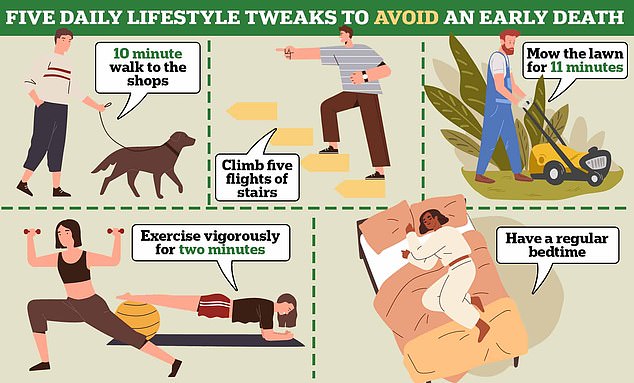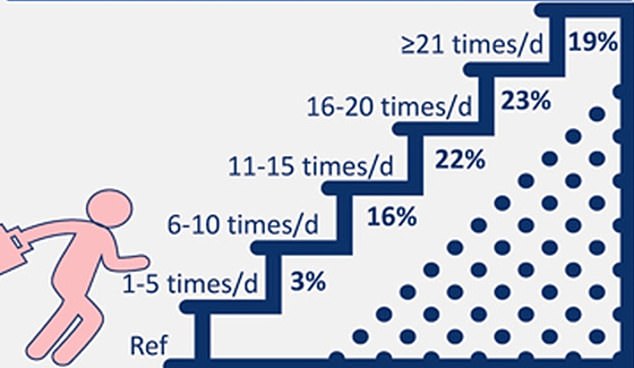From a 10-minute walk to the shops to climbing FIVE flights of stairs, 5 simple lifestyle tweaks experts say you should adopt to avoid an early death…
We all know that exercise is good for us, but busy schedules can make it impossible to organize a good gym session.
However, research shows that simple lifestyle changes such as taking the stairs, walking to the shops and doing a little gardening can be enough to reduce the risk of an early death.
In Western countries such as Britain, adults spend an average of nine to ten hours a day sitting, especially during the time they are at work.
To get us moving and moving enough to make a difference, researchers have looked at the bare minimum we all need to do.
Here, MailOnline explores some of the small changes you can make in your daily life to prevent an untimely death.

Taking the stairs can reduce the risk of an early death (top middle), according to a study this week by scientists in the US. Here, MailOnline explores some of the small changes you can make to stay healthy for longer. A 10-minute walk to the shops can reduce the effects of sitting for twelve hours (above right), while mowing the lawn can reduce the risk of premature death by a tenth. Just two minutes of vigorous exercise a day (bottom left) and sticking to a regular sleep pattern (bottom right) can also boost health, according to researchers
10 minutes walk to the shops
A sedentary lifestyle can lead to an early death by increasing your chances of developing high blood pressure, diabetes and heart disease.
But even if you don’t reach your goal of 10,000 steps a day, simply taking a 10-minute walk to the shops and back could save your life.
Because more than 22 minutes a day of moderate and vigorous exercise ‘eliminates’ the risk of premature death from too much sitting, according to a study published this week.
Researchers looked at almost 12,000 people aged 50 and over in Norway, Sweden and the US who were given fitness trackers to assess their physical activity.
Those who were sedentary for more than 12 hours a day had a 38 percent higher risk of dying young, compared to those who were sedentary for eight hours a day.
However, this risk disappeared when people completed 22 minutes of physical activity.
Dr. Jakob Tarp, senior author of the study, said: ‘For many people, being less sedentary in our daily lives is not possible.
‘So this is hopeful that people can do a relatively small amount of physical activity and offset the effects of sitting all day.
‘The most important thing is that this is achievable, for example by taking a brisk walk during the lunch break or after work, or by making small changes during the day, such as taking the stairs instead of the lift.’
Climb five flights of stairs a day
The next time you’re about to take the elevator or escalator, consider taking the stairs.
That’s because climbing just five flights a day can lower your risk of heart attacks and strokes by three percent, according to an article published this week.
But the benefits don’t stop there: Those who climb ten or more flights saw their risk drop by a fifth, a decade-long study shows.
Just like jumping, cycling or doing aerobics, climbing stairs is considered a high-intensity activity.
Scientists from Tulane University in the US monitored the health of 458,860 people in Britain for an average of 12.5 years.
Participants were asked how often they climbed stairs at the start of the study and again five years later.
Over the course of the project, 39,043 developed atherosclerosis, where the arteries become narrowed, making it difficult for blood to flow through them.
The results, published in the journal Atherosclerosisshowed that participants who Climbing at least six flights per day had a 16 percent lower risk, while at least 11 flights were associated with a 22 percent lower risk.
The researchers concluded that climbing more than five flights of stairs – about fifty steps – was associated with a lower risk of the disease, which can lead to heart attacks and strokes.

Those who climbed six to 10 flights per day had a 16 percent lower risk, people who made 11 to 15 flights had a 22 percent lower risk, and those who climbed 16 to 20 had a 23 percent lower risk, compared to those who climbed for lifts or chose escalators
Mow the lawn
By keeping your garden in shape, you can also keep your heart healthy.
Mowing the lawn for eleven minutes every day could prevent an early death for one in ten inactive people, researchers from the University of Cambridge have discovered.
They analyzed 196 research articles on the health benefits of exercise, involving more than 30 million adults.
They found that doing at least 75 minutes of moderate exercise per week – 11 minutes per day – could help people dodge early-onset disease, cardiovascular disease and cancer.
Moderate exercise includes brisk walking, water aerobics and dancing, as well as pushing a lawn mower.
However, the NHS recommends at least 2.5 hours of moderate activity every week, which works out to 21 minutes per day.
Alternatively, people can do 75 minutes of vigorous exercise such as running, swimming, jumping and climbing stairs, the health department says.

Researchers claim that one in ten premature deaths could be avoided if inactive people mowed the lawn for 11 minutes a day (File image)
Practice vigorously for two minutes
It can be difficult to cram a long gym session into a busy week.
But experts say this may not be necessary, as just two minutes of vigorous exercise a day can reduce the risk of dying young.
According to scientists, simply skipping or doing two minutes of aerobic exercise instead of running three miles may be enough.
The University of Sydney team analyzed data from more than 70,000 Brits, tracking their exercise levels over a week and their health over the next seven years.
The results showed that people who did just 15 minutes of vigorous activity per week – or 2m 9s per day – were 18 percent less likely to die within the study period.
This was compared to those who did just two minutes a week.
But more is still better.
Those who did that, compared to those who did 53 minutes a week, about seven and a half minutes a day, had a 36 percent lower risk of death in five years, compared to those who did two minutes a week.
Lead author Dr Matthew Ahmadi said: ‘The results indicate that accumulating vigorous activity in short bursts throughout the week can help us live longer.
‘Given that lack of time is the most commonly reported barrier to regular physical activity, building up small amounts sporadically throughout the day may be a particularly attractive option for busy people.’

Simply skipping, walking up the stairs or doing two minutes of aerobics may be enough to prevent an early death
Maintain a regular sleep schedule
Getting seven to nine hours of sleep a night will not only help you feel fresh in the morning, but can also keep chronic health problems at bay.
Researchers from Harvard Medical School monitored the sleep patterns of 1,726 participants by measuring activity through light and movement.
They were categorized as ‘regular-optimal’ sleepers or ‘irregular-inadequate’ sleepers. During the follow-up period, 176 people died.
The results showed that participants who maintained a regular and healthy sleep schedule – getting enough sleep every night and going to bed and waking up regularly – had a 39 percent lower risk of early death than those who did not.
Not getting enough sleep has been linked to chronic health problems such as heart and kidney disease, high blood pressure, diabetes, stroke, obesity and depression.
Everyone needs a different amount of sleep, but the NHS recommends that adults get between seven and nine hours a night and children nine to 13 hours.
